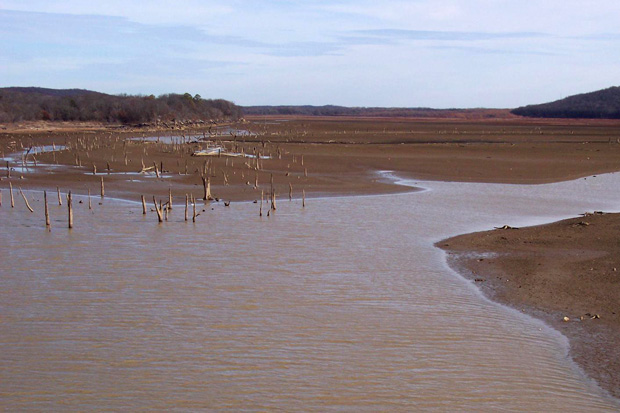
A portion of Atoka Lake from January 2013. Oklahoma City has been using Atoka Lake water for decades.
Pennie Embrey / Oklahomans for Responsible Water Policy


A portion of Atoka Lake from January 2013. Oklahoma City has been using Atoka Lake water for decades.
Pennie Embrey / Oklahomans for Responsible Water Policy

Jim Cox / Oklahomans for Responsible Water Policy
A portion of Atoka Lake from January 2013. Oklahoma City has been using Atoka Lake water for decades.
When Oklahoma City decided to build a pipeline that would eventually carry water from Sardis Lake to the city, the Choctaw and Chickasaw Nations filed suit in federal court arguing that most of the water in southeastern Oklahoma belongs to them.
That was in 2011. The parties have been negotiating outside of court since early 2012, and the case was stayed for a sixth time Sept. 17.
But the tribes’ claim has its origins in pre-Civil War removal treaties. Specifically the 1830 Treaty of Dancing Rabbit Creek that established the Choctaw Nation.
“The United States, in order to induce the tribes to remove to Indian Territory, made them promises the likes of which you don’t see in any other set of treaties,” University of Oklahoma law professor and tribal law expert Taiawagi Helton says. “The promise of near complete sovereignty, the promise that the land would never be part of any state. I think there’s a great argument that water was conveyed to them along with all of the other natural resources.”
Then the Civil War happened, and the Choctaw Nation sided with the South. When the war was over, the old agreements were ignored and the tribe was punished with a new set of treaties and laws designed to erode its government.
The Dawes Act was one of them. It took large tracts of Indian land and divvied them into individual plots that were given to tribe members. Over time, the way was cleared to statehood, and the state has been allocating water rights in southeast Oklahoma ever since.

Logan Layden / StateImpact Oklahoma
University of Oklahoma law professor and tribal law expert Taiawagi Helton says Choctaw and Chickasaw water rights were never revoked.
“There was this long period of time when people thought the post-Civil War treaties, and then statehood, had sort of disbanded tribal governments,” Helton says.
Now, however, tribal governments like the Choctaw and Chickasaw Nations are major players in shaping policy in Oklahoma.
That’s because in 1976 a federal judge declared that — despite the federal governments intention to dissolve the Creek tribal government, it never explicitly did so. It never explicitly dissolved the Choctaw and Chickasaw Nations either. And since then, tribal governments have seen a resurgence.
Still, though, water just wasn’t a controversial issue. In fact, the tribes were working with the state as late as 2002 to do what is now politically unthinkable “when the state and tribes cooperated rather remarkably in a discussion to sell water to Texas,” Helton tells StateImpact.
The situation has changed. Add a devastating drought and the prospect of a new pipeline from Sardis Lake to OKC, and it’s a recipe for a fight. The Choctaw and Chickasaw Nations say their right to ownership of the water was never revoked and they want it back.
The state says the tribes’ decision to join the Confederacy — and, eventually, statehood — nullified those rights.
Many of the area’s residents just don’t want to see Sardis messed with. That includes State Sen. Jerry Ellis, D-Valliant, who says Oklahoma City already gets enough water from southeast Oklahoma.
“They just keep coming southeast and wanting to take more water,” Ellis says.
Oklahoma City already uses water from the region’s Atoka Lake, and Ellis doesn’t want to see what happened to Atoka happen to Sardis.
“The former Sheriff would tell me that whenever it would get real dry, ‘That’s where we go to recover stolen vehicles.’ People dump them in Atoka Lake,” Ellis says. “And they promised those people 50 or 60 years ago that in exchange for their water that they were going to bring growth down there.”
Of course, the tribal governments are also unlikely to sit on such a valuable resource. The outcome will depend on further negotiation or litigation. Either way, Helton says it could be a long, legal slog.
“If we litigate this to the end, you and I will long be retired before this is resolved, the ground will be drier under our feet, and we will have both spent millions and millions of dollars while this fight takes place,” Helton says.
Even a settlement could take many years to reach. Wyoming is still trying to work out all of the tribal water rights in the Big Horn River Basin 36 years after it started.